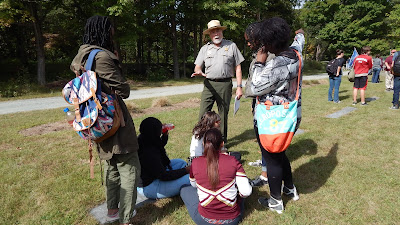 |
Blackstone Canal
Engineering and Technology Academy Invites You!
The ETA, in conjunction with the National Parks Service, are holding their 7th annual “Bringing Back the Blackstone” project fair, and welcome the community to see. Those who attend will have the freedom to walk around and talk to the students, parents, and staff about the projects and the future of the Canal District, in a casual environment. Snacks and drinks will be provided.
Date:
|
Tuesday, December 15, 2015
Bringing Back the Blackstone
Labels:
blackstone canal,
class of 2019,
ETA,
learning fair
Monday, December 7, 2015
Kelly House, Lincoln/Cumberland, RI
 |
| Ranger Chuck Arning presenting a slide show on life in the mill village in the classroom |
On October 8th, students from the ETA went to Kelly House. Kelly House is the site where the Kelly Mill and village once stood. Students explored the mill owner's house, which has been converted into a museum, detailing the evolution of factories and industrial life. Students walked along the canal, analyzing the challenge of effective water control. Students designed and presented solutions for better management of the Blackstone River. Finally, students learned how the workers lived in the village next to the factory. This field trip was made possible by the funding from the National Park Foundation "Ticket To Ride" Program.
 |
| Ranger Chuck Arning helping students connect history and engineering. |
This what students said about the trip:
- "We [took] a tour of of what was left from the Industrial Revolution..."
- "We walked around and saw the factory."
- "I learned about the history of the place and how everything worked."
- "On this field trip we went to a mill and saw what they did and what the canal was used for."
- "On this field trip we learned about how factories worked and about how they received power."
- "On the field trip, we took a tour of the Kelly House and tried to find a way to fix water distribution."
- "We walked around the mill area, discussed our plans to control the canal water, and had a mini tour of the Kelly House."
- "We took a look at the old mills and canal..."
- "...we learned where the old mills where with a map..."
- "...we saw what [the factories] looked like years ago..."
The students had this to say about what they learned:
- "The Blackstone Canal created mill villages."
- "The bell controlled what time people got up."
- "Mill owners controlled the people."
- "We saw a figure of Captain Kelly."*
- "...about mills around the Blackstone River..."
- "...about the living conditions of people in the mill village..."
- "The factory is used as a residential area now."
- "How the canal trade port works."
- "How long it took to get from Worcester to Rhode Island."
* Captain Kelly was the owner of the Kelly mill at one time.
Labels:
blackstone canal,
class of 2019,
ETA,
field trip,
kelley house,
learning fair
Friday, December 4, 2015
Riverbend Farm, Uxbridge, MA
Students from Doherty Memorial High School in the Engineering and Technology Academy visited Riverbend Farm on September 25th, to learn about the Blackstone Canal and canal locks. The trip specifically highlighted the challenges to controlling water for power as well as some solutions. Finally students, in cooperative learning groups, designed and presented a proposal for the future bike path to be constructed in the area. This was an opportunity for students to understand the impact the Blackstone Canal had on the area, and how much impact their hypothetical new canal would too. This field trip was made possible by the funding from the National Park Foundation "Ticket To Ride" Program.
This is how the students described the field trip:
- "...we had to figure out a map using contour lines..."
- "...we saw how much things have changed over time."
- "We walked through the woods learning about transportation and lifestyle in the Industrial Revolution."
- "...we made a map for a new bike trail..."
- "On the field trip, I learned about the function of the canal and the area of land around the farm."
- "...we thought up bike paths and presented our ideas."
- "On the field trip we had to figure out a bike path on a map using contour lines, also we hiked up 'Goat Hill' and saw the canals and a bit about the history of the hill..."
- "I learned how they split rock."
- "How rock was shaped."
- "[People] used the [Blackstone] canal to transport goods."
- "Seeing baby turtles."
- "The [Blackstone] canal was effective for transportation."
- "The [Blackstone] canal worked like an elevator."
- "Horses would pull the horses along the [Blackstone] canal."
- "I learned what engineers think about when designing things, like making the bike path."
- "...how people made canals back then, and what tools people used."
- "The stagnant water near the river is filled with duck weed."
- "How topography maps work."
- "I learned how the locks worked to raise the boats higher."
- "That the boats were 9 and a half ft wide and over 70 ft long."
- "The boats [only] had about 6 inches of extra space when in the [Blackstone] canal."
- "There are many factors to building a successful bridge."
- "The construction of certain things can greatly affect the people around it."
- "With enough hard work anything can be made."
- "Farmers were paid $125 if a bridge or the canal divided their property."
- "The [Blackstone] canal led from Worcester to Providence."
- "...what to look for in a bike path."
- "The boats traveled [down the canal] at 3 mph."
- "Planning a bike path is a lot harder than you think."
Labels:
blackstone canal,
class of 2019,
ETA,
field trip,
learning fair,
riverbend farm
Subscribe to:
Comments (Atom)







